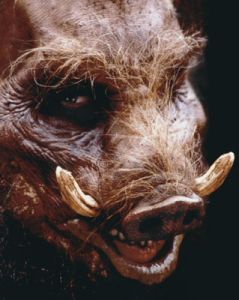Swine hybrid for Organ havesters !

Monster mutants, half animals, half humans may no longer belong just to SF literature and movies or cartoons.
Three British research teams have already launched the proposal of making embryos by merging human and animal material. Cow or rabbit eggs would be used as a short cut to produce cloned embryos which could yield human embryonic stem cells.
The idea remains on hold for the moment, as the UK regulator of embryo research decided on Thursday. Under intense pressure from the scientists, the Human Fertilization and Embryology Authority decided to consult the public opinion about
this, as many see it unethical and think that it should be forbidden. Stem cells are
vital for the scientific research into major hereditary diseases, such as Parkinson's disease and many brain degenerating diseases - like haemophilia - just to name a few.
The cells created would be the same as the patient's ones, carrying the defects that trigger the conditions, and investigating these cells would show off the causes of the disease or new drugs could be discovered.
As opinions are so diverse and the technique was not checked by now, the HFEA does not rush into allowing the research to go ahead. But the HFEA also found this research to be legal in the UK under the existing regulations.
This disagrees with the UK government's argument, published in December 2006, that creation of human-animal chimeras or hybrids should not be allowed. "After careful consideration, the authority has ruled that, under current legislation, these sorts of research would potentially fall within the remit of the HFEA to regulate and license, and would not be prohibited by the legislation", said Angela McNab, chief executive of the HFEA.
"One good outcome is that the HFEA has not buckled under pressure from the government on this issue," said Stephen Minger of King's College London, UK, and head of one of the three teams which would produce the embryos. "Although we are naturally disappointed that the HFEA has not recommended that our research applications go to the licensing committee, we are happy with their decision to consult both public and scientific opinion regarding cloning of human cells using non-human eggs," he added.
"They have not supported an outright ban of our work and, moreover, the possibility of a further public consultation exercise gives us the opportunity to explain why the science is so very important for Britain and humanity in general", said Lyle Armstrong, head of another of the three teams, at the University of Newcastle-upon-Tyne, UK.

Monster mutants, half animals, half humans may no longer belong just to SF literature and movies or cartoons.
Three British research teams have already launched the proposal of making embryos by merging human and animal material. Cow or rabbit eggs would be used as a short cut to produce cloned embryos which could yield human embryonic stem cells.
The idea remains on hold for the moment, as the UK regulator of embryo research decided on Thursday. Under intense pressure from the scientists, the Human Fertilization and Embryology Authority decided to consult the public opinion about
this, as many see it unethical and think that it should be forbidden. Stem cells are
vital for the scientific research into major hereditary diseases, such as Parkinson's disease and many brain degenerating diseases - like haemophilia - just to name a few.
The cells created would be the same as the patient's ones, carrying the defects that trigger the conditions, and investigating these cells would show off the causes of the disease or new drugs could be discovered.
As opinions are so diverse and the technique was not checked by now, the HFEA does not rush into allowing the research to go ahead. But the HFEA also found this research to be legal in the UK under the existing regulations.
This disagrees with the UK government's argument, published in December 2006, that creation of human-animal chimeras or hybrids should not be allowed. "After careful consideration, the authority has ruled that, under current legislation, these sorts of research would potentially fall within the remit of the HFEA to regulate and license, and would not be prohibited by the legislation", said Angela McNab, chief executive of the HFEA.
"One good outcome is that the HFEA has not buckled under pressure from the government on this issue," said Stephen Minger of King's College London, UK, and head of one of the three teams which would produce the embryos. "Although we are naturally disappointed that the HFEA has not recommended that our research applications go to the licensing committee, we are happy with their decision to consult both public and scientific opinion regarding cloning of human cells using non-human eggs," he added.
"They have not supported an outright ban of our work and, moreover, the possibility of a further public consultation exercise gives us the opportunity to explain why the science is so very important for Britain and humanity in general", said Lyle Armstrong, head of another of the three teams, at the University of Newcastle-upon-Tyne, UK.
